Staying Diplomatic: The Foreign Service Journal During Controversial Times
This article was originally published in the November-December 2020 Signature magazine, reposted here with permission.
BY DMITRY FILIPOFF
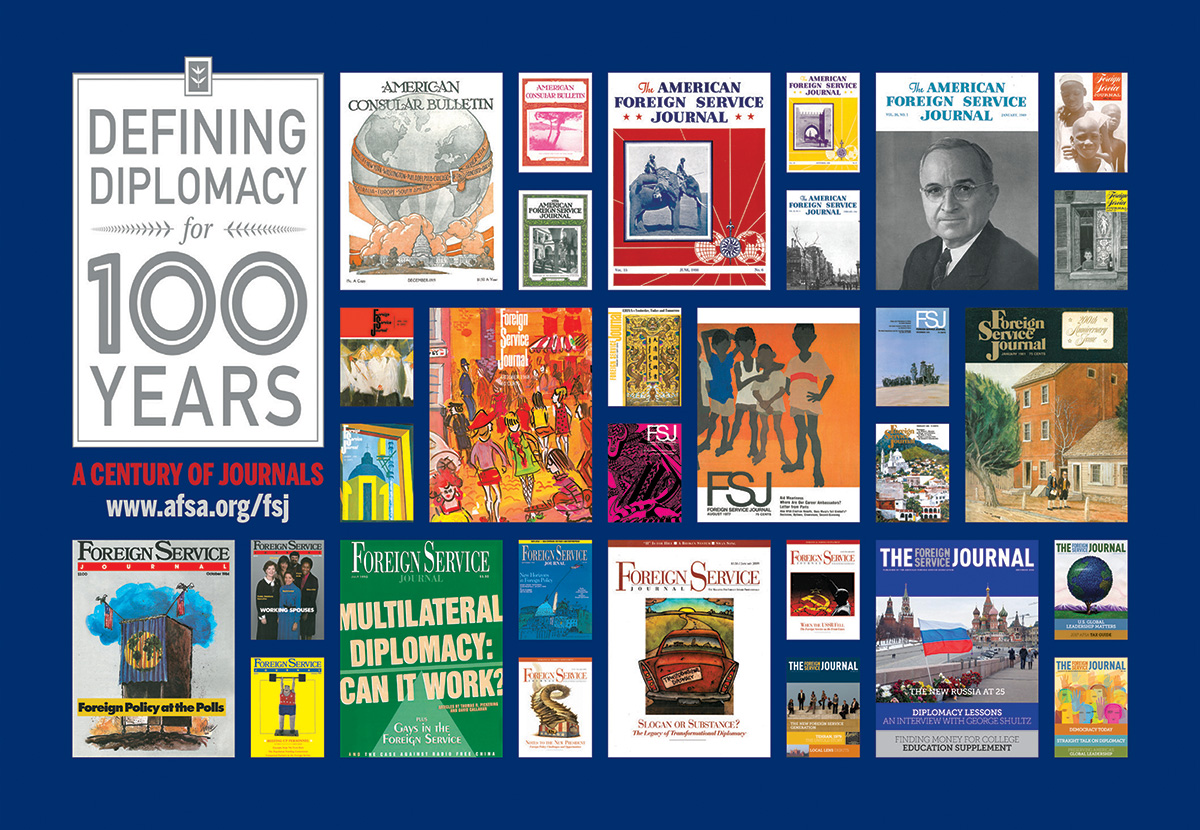
The Foreign Service Journal celebrated its centennial in 2019.
For more than a hundred years, The Foreign Service Journal (FSJ) has been the professional publication for the United States Foreign Service, the nation’s diplomatic corps. Over this long stretch of time, the Journal has covered topics ranging from foreign policy initiatives to the mainstay issues of managing the Foreign Service.
So how does the Journal navigate coverage when AFSA’s members—America’s diplomats—find themselves in political crossfire surrounding major world events and crises? How should the FSJ cover foreign policy issues that have boiled over into major political controversies? How can the magazine facilitate healthy discourse on heated topics without exposing itself to charges of partisanship?
These are the kinds of questions FSJ editors grapple with. Over time, they have been able to more consistently steer the publication through controversy by holding onto two clear operating principles: support for career diplomacy and editorial independence.
Establishing Editorial Independence
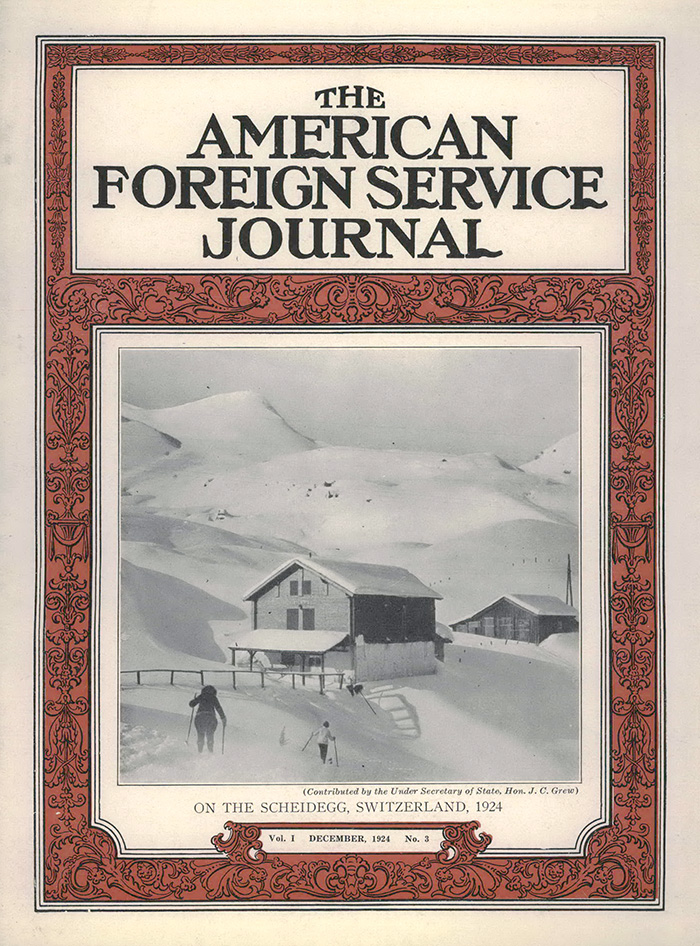
1924 marked a new name and mission statement for The American Foreign Service Journal.
In 1924, the magazine became The American Foreign Service Journal, and a mission statement issued in tandem with the name change described the magazine’s main purpose as “inspirational and not educational.” In particular, according to the statement: “Articles of a tendentious nature, especially such as might be aimed to influence legislative, executive, or administrative action with respect to the Foreign Service or the Department of State, are rigidly excluded from its columns.”
Excessive concern for offending State Department sensitivities and an explicit prepublication review process generated such a sterile publication that the State Department eventually relinquished its requirement for prior review.
Yet while the publication did become livelier, it would be decades before the FSJ could seriously take on controversial subjects and publish constructive critiques of departmental and Foreign Service management. The Journal began regularly publishing such content in the mid- to late-1940s. This notably took the form of wartime essay contests on Foreign Service reform that were seriously considered by then Secretary of State Edward Stettinius Jr.
“I can think of no more useful mine of information and recommendations,” Stettinius wrote at the time. “All of us who are interested in these essays thank you.” After changing course from being an “inspirational” publication and instead aiming for more educational goals, the publication quickly came into its own as a serious venue for constructive discourse on the profession of diplomacy.
Today, the AFSA governing board sets the operating guidelines for the magazine. The FSJ bylaws passed by the AFSA governing board in 2002 mandate that the magazine shall “advance the goals of AFSA” and be a “forum for lively debate of issues of interest to foreign affairs professionals by authors in the Foreign Service, the media, academia,” and so on. Though the governing board has final authority as publisher, it has not gotten involved, except on very rare occasions, with the editorial process.
Appropriate governance structures are critical for safeguarding editorial independence. Carefully defined bylaws and established checks and balances between editorial and executive bodies can help insulate professional publications from unhelpful internal and external pressures.
Navigating Controversy: The Impeachment
Lost a Diplomat, Gained a Hero
Excerpt from March 2020 FSJ Editor’s Letter by Shawn Dorman:
“She’s going to go through some things,” said the president in his call with Ukrainian President Volodymyr Zelensky last July. Ambassador Marie Yovanovitch went through some things—as she did her job, served her country, and spoke the truth. As the impeachment trial came to a quick end, the three-time ambassador retired.
But while the Service lost another outstanding senior diplomat, it also gained a hero.The impeachment process brought to light the integrity and dedication of career diplomats on the front lines implementing official U.S. policy and advancing relationships around the world.
At AFSA and through the Journal, we will continue supporting the Foreign Service as it goes through things, facing new challenges. We will continue pointing to the critical importance of professional diplomacy for national security and telling the story of the U.S. Foreign Service, both for our members and the public and for the historical record.
In late summer 2019, a whistleblower from the intelligence community filed a complaint that reached the Office of the Director of National Intelligence alleging that “the president of the United States is using the power of his office to solicit interference from a foreign country in the U.S. 2020 election.”
The administration was accused of withholding nearly $400 million in congressionally approved military aid as part of a quid pro quo to coerce the Ukrainian president into intervening in American domestic politics. The administration was also accused of creating back channels (through the president’s personal lawyer Rudolph W. Giuliani) to circumvent established diplomatic lines of communication. Democrats in the House of Representatives launched an impeachment inquiry, and Republican lawmakers defended the president’s conduct.
Several career diplomats (and AFSA members) found themselves in the crossfire of the events that followed and were called to testify as witnesses before congressional impeachment investigators. Ambassador Marie “Masha” Yovanovitch, Ambassador Michael McKinley, David Holmes, Jennifer Williams, and George Kent were all questioned before the House Judiciary Committee. As these diplomats testified under oath to what they witnessed, they became prime targets for partisan attacks in one of the most controversial investigations in modern American history.
The diplomacy-centered nature of the controversy and the fact that many of the witnesses were career diplomats meant that this issue demanded careful attention from both AFSA and the FSJ. It was never a question of whether to cover the impeachment, but how to do it in a nonpartisan, nonpolitical way.
In the urgency of the controversial moment, wading into the fray seems fraught with uncertainty and difficulty. To see one’s way through, it is helpful to consider how future readers and association members will regard the choices a publication makes in using its voice.
During the winter of 2019, the Journal covered developments in various ways. The events themselves were reported in the Talking Points section, which features short reports on current events related to diplomacy that are written by the editorial team with careful consideration of journalistic sourcing. Excerpts from our diplomats’ impeachment testimonies were collected and shared in the Journal.
Significant historical insight was brought to bear in an article by Harry Kopp, “Truth and Honor,” in the Speaking Out section, the premier space for opinion pieces that can spark discussion and debate. Kopp drew historical parallels between those testifying in impeachment proceedings and the Foreign Service officers who had their allegiances and professionalism questioned during the Red Scare of the McCarthy era.
While valuable, historical parallels and journalistic reporting did not go far enough in getting at the implications of the controversy for the Foreign Service. As the magazine of the professional association and union for U.S. diplomats, the FSJ team decided it was appropriate and necessary to openly side with the career diplomats under fire, explicitly defending their integrity and spotlighting their testimony to educate the public about what career diplomats do.
In Defense of Career Diplomacy
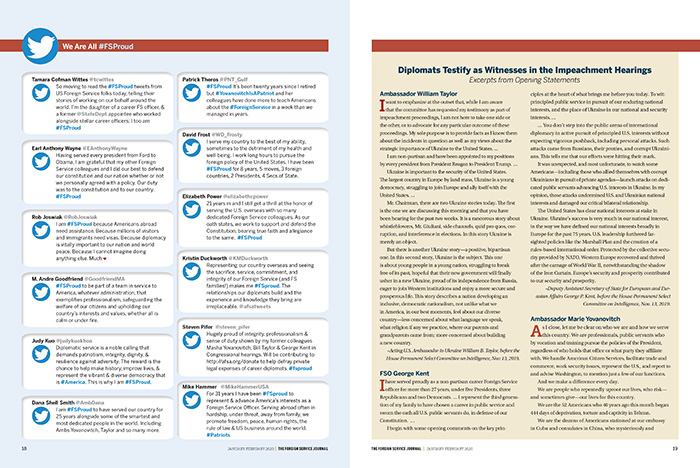
Excerpts from diplomats’ impeachment testimonies were collected and shared in the Journal, as well as comments from members on Twitter.
In its December 2019 edition, only weeks before the House of Representatives met to formally vote on impeachment, the FSJ published a unique Speaking Out “In Support of Professional Nonpartisan Diplomacy” (afsa.org/support-professional-nonpartisan-diplomacy)—a collection of statements defending nonpartisan diplomacy from lawmakers, other foreign affairs associations, and retired ambassadors. The piece concluded with AFSA’s plea to “honor and respect the nonpartisan, nonpolitical work of the dedicated public servants of the U.S. Foreign Service” and not allow that work to be politicized nor them to be dragged into partisan political battles.
The FSJ continued to share the words and deeds of the diplomats, who stayed true to their oaths and service to their country amid enormous pressure not to do so. When Yovanovitch was attacked by presidential tweet, the Journal called that out and shared her words, which reflected honorably on the entire Service.
Staunch defenses of diplomacy were also mounted in the AFSA president’s column. “We have all witnessed the courage and patriotism of our colleagues,” Ambassador Eric Rubin wrote. “We are nonpartisan, nonpolitical public servants who carry out our work and uphold our oath to the Constitution.”
The trials of McCarthyism scarred the Foreign Service for a generation. A year after McCarthy’s vicious attacks finally faded, George Kennan—one of the great luminaries of the Foreign Service—wrote of the “humiliation, bewilderment, and the deepest sort of discouragement to hundreds of [Foreign Service] officers.”
For the Foreign Service, the memory of impeachment has come to mean something different altogether. As FSJ Editor in Chief Shawn Dorman wrote, the career diplomats subpoenaed as witnesses in the impeachment hearings “look more like superheroes standing up to share the truth. ... The Foreign Service ... feels a sense of pride in their dedication, professionalism, patriotism, and bravery, on display for the American public and the world to see.”
The FSJ, like these diplomats, had made its stand.
A Publication’s Legacy
Navigating controversy is a part of the FSJ’s history. It took many editors who valued having a voice and understood what was truly important to their audience to make the FSJ a place for real debate. One indicator of the FSJ’s successful navigation of tricky political waters is that senior-level officials, both active-duty and retired, want to write for the Journal, adding their voices to the conversation we aim to foster.
Certainly, the FSJ has to know how to pick its battles. In guiding such decisions, the interests and roles of its audience, the U.S. Foreign Service, remain first and foremost. The magazine stood up for the Foreign Service during the impeachment because the integrity of nonpartisan professional diplomacy a core principle of what the Foreign Service is and how it serves the nation—was under assault.
In the urgency of the controversial moment, wading into the fray seems fraught with uncertainty and difficulty. To see one’s way through, it is helpful to consider how future readers and association members will regard the choices a publication makes in using its voice. In time, the dilemmas will fade, new controversies will replace the old, and the next edition’s proofing will beckon. What remains is a standing record of decisions made, voices shared, and historical moments seized or skipped.
When future readers encounter silence in the record during times when controversy raged, they are left to wonder and guess at the omission. But when they encounter hard-charging debates, stances strongly argued, and editors proud to add their say, they find a publication unafraid of its own voice.
Archives hardly remember whether indecision was convenient at the time or whether some other influence is responsible for a publication’s choice of content. What controversy offers is much more than just a moment’s relevance. It offers a chance to be true to the tradition of editorial excellence.
About The Foreign Service Journal
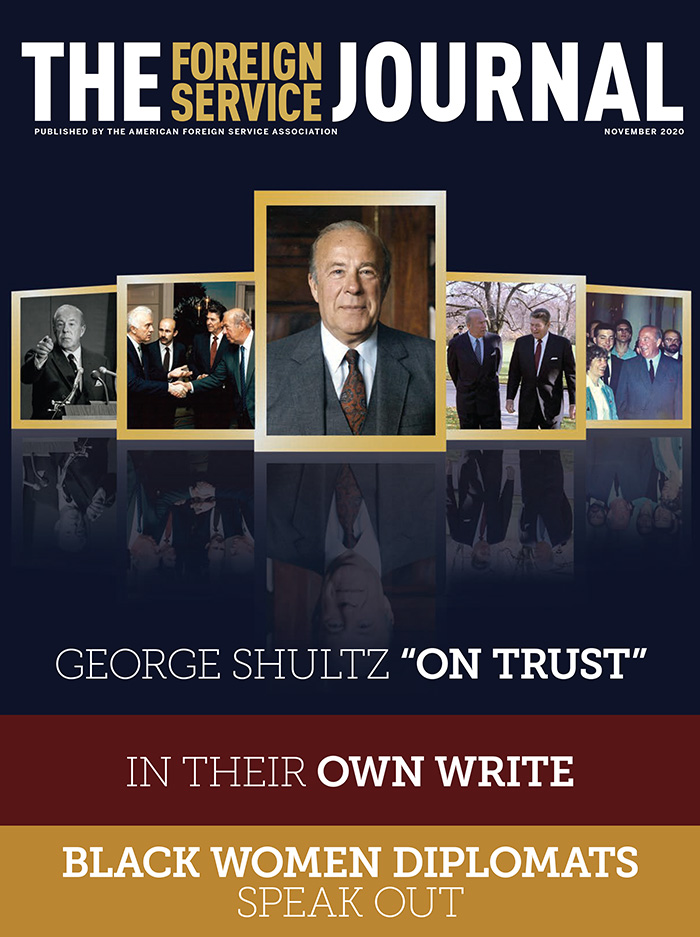
For a professional publication such as the FSJ, editorial independence adds value and legitimacy. The structure of FSJ helps: Each issue includes a monthly AFSA President’s Views column and a separate section (of 8 to 30 pages) called AFSA News, which shares views and news from the association and its officers. AFSA News is overseen by the governing board. The rest of the magazine, “the white pages,” is overseen by an editorial board and the Journal’s professional staff. This structure allows the magazine to air a variety of perspectives, cover controversial topics, and carve a path forward in leading the discourse on professional diplomacy.
The FSJ was not always the publication it is today. According to former Foreign Service officer, editorial board member, and unofficial AFSA historian Harry Kopp, when the magazine was first published in 1919 as the American Consular Bulletin, “The State Department found the idea of an independent publication deeply unsettling and insisted on prepublication review [by the Secretary of State] of every issue.”
The Foreign Service Journal (FSJ) tells the story of career diplomacy, which is by design nonpartisan. American diplomats, who serve in Washington, DC, and in 273 U.S. embassies and consulates around the world, take an oath to the Constitution, not to any president or administration. Career diplomats—unlike political appointees—are public servants. They serve across administrations, regardless of the party or personalities in charge.
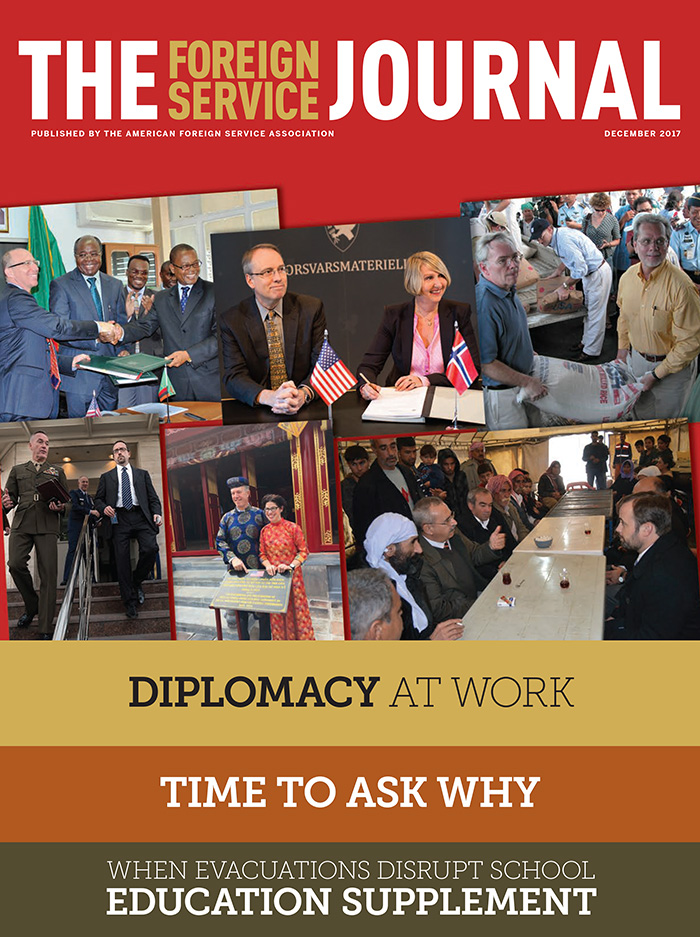
Published 10 times a year and averaging 80 to 108 pages, the FSJ is the flagship publication of the American Foreign Service Association (AFSA). Its unique role is in covering diplomacy from an insider’s perspective, through the eyes of the practitioner. Its primary audience is AFSA’s membership, the active-duty and retired diplomats and development professionals, and their families, from six foreign affairs agencies (Department of State, U.S. Agency for International Development, Foreign Commercial Service, Foreign Agricultural Service, Animal and Plant Health Inspection Service, and the U.S. Agency for Global Media).
The Journal is also a resource for those outside the Foreign Service, from military personnel to students and those considering a career in foreign affairs. Every month, AFSA deliberately makes each edition available online for free, with the aim of bringing knowledge and perspectives from the Foreign Service to researchers, policymakers, and the public. All 101 years of the Journal have been digitized and are searchable, serving as a record of U.S. diplomatic history.
As the union and professional association for career U.S. diplomats, AFSA defends, advances, and promotes the Foreign Service. In his April 2020 column in the Journal, President Ambassador Eric Rubin emphasizes: “We are passionate about our commitment to nonpartisan, nonpolitical service to our country. We will loyally serve whomever the American people elect as their leaders and work assiduously to ensure the success of the policies established by our elected leaders”


